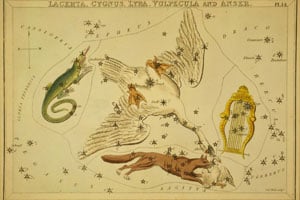Cygnus: The Celestial Swan
Cygnus is a swan-shaped constellation passed on to us from the ancient Greeks. Learn more!

Cygnus is a northern constellation that sits along the path of the Milky Way. It is one of the 88 officially recognized modern constellations, and was among the 48 constellations listed by the Second Century Greek astronomer Ptolemy.
The name Cygnus is a Latinized version of the Greek word for swan. It contains 84 stars, nine of which make up its shape, which resembles a swan in flight.
Cygnus borders the constellations Cepheus, Draco, Lyra, Vulpecula, Pegasus, and Lacerta. It is notable because it features the well-known asterism known as the Northern Cross, and its brightest star, Deneb, is also part of another asterism, the Summer Triangle. Another star of interest is Albireo, which is actually made up of two stars, a bright yellow one and a slightly smaller blue one.
Because of its position near the visible band of the Milky Way, Cygnus is home to a number of deep sky objects, including the North America Nebula (NGC 7000), the Pelican Nebula (IC 5070), the Veil Nebula (NGC 6960, 6962, 6979, 6992, and 6995), the Crescent Nebula (NGC 6888), and the Fireworks Galaxy (NGC 6946), named because more supernovae have been seen there than in any other galaxy. The constellation is also home to 12 stars with planetary satellites.
Greek mythology features numerous legendary swans, each of which has been variously identified with the constellation. One of the most famous was Cygnus, the best friend of Phaeton, son of the Sun god Helios. When his best friend was slain by Zeus during his ill-fated attempt to drive his father’s chariot, Cygnus asked to gods to allow him to retrieve his friend’s body, which was trapped by the roots of a tree at the bottom of the Eridanus River. Zeus said he could turn Cygnus into a swan, which would allow him to dive deep enough to recover Phaeton’s body, but that he must remain that way forever, and his own life would be shortened to the lifespan of a swan. Cygnus agreed and, when he died, the gods immortalized him in the heavens as a reward for his sacrifice.
Other notable swans include Zeus, himself, who transformed himself into a swan to seduce Queen Leda, wife of the king of Sparta. The legendary poet Orpheus was also said to have been transformed into a swan by the gods after his death and placed in the sky next to his lyre (the constellation Lyra).

Jaime McLeod
Jaime McLeod is a longtime journalist who has written for a wide variety of newspapers, magazines, and websites, including MTV.com. She enjoys the outdoors, growing and eating organic food, and is interested in all aspects of natural wellness.





